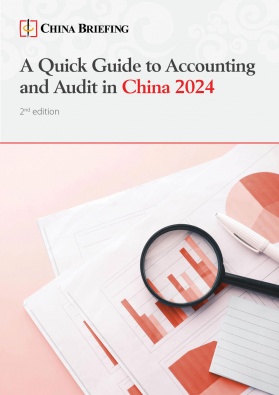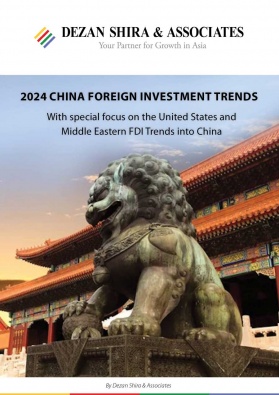China’s Central Economic Work Conference Outlines Key Priorities for 2024
China’s 2023 Central Economic Work Conference emphasized the importance of striking a balance between the pace and quality of development while providing an inside perspective on key economic priorities for the year 2024.
China’s annual Central Economic Work Conference (CEWC), held on December 11-12, 2023, conveyed a clear message: economic growth is the top priority. The event ended with a 4,355-character outline detailing the leadership’s economic plans for the coming year. The comprehensive readout reflects China’s multifaceted strategy for a robust recovery in 2024, addressing various sectors and priorities.
Indeed, in his keynote speech at this year’s CEWC, Chinese President Xi Jinping encapsulated China’s economic achievements in 2023, analyzed the current economic landscape, and delineated the government’s economic agenda for 2024. Premier Li Qiang then reiterated these priorities in his concluding speech.
China’s economic roadmap for the upcoming year is framed against the backdrop of the country’s post-pandemic recovery. Clues about the country’s future economic direction had already been revealed over the course of the year.
In a notable move, the State Council acted decisively in August, issuing a comprehensive set of opinions to boost foreign direct investment (FDI) in China.
Following this, in October, the government made an unusual decision to issue RMB 1 trillion (US$139 billion) in sovereign bonds by year-end. This adjustment increased the 2023 budget deficit target to 3.8 percent of the gross domestic product (GDP), up from the initial 3 percent, allowing more flexibility to intensify stimulus measures.
These measures exemplify the nation’s commitment to stimulating economic recovery and opening avenues for growth.
Evaluation of China’s economic performance in 2023
In 2023, China’s economy has shown signs of recovery, especially following the government’s decision to lift all remaining COVID-19 restrictions and gradually open up its borders to international travelers – most recently even granting visa-free travel to a number of countries.
As a direct consequence, many sectors of the economy that had stagnated during the pandemic and lockdown periods, have experienced notable revitalization. Meanwhile, the rebound in movement and travel sparked pent-up consumption.
Notably, the International Monetary Fund (IMF) has revised its growth forecast for China, projecting a robust 5.4 percent growth for the year. This upward revision is attributed to better-than-expected third-quarter growth and positive policy developments from Beijing.
Despite the encouraging forecast, however, challenges persist on the economic horizon. The IMF foresees a moderated growth rate of 4.6 percent in 2024, exercising caution due to enduring weaknesses in the property market and subdued external demand. These factors present hurdles to sustaining the upward economic trajectory.
In tandem with these considerations, while recognizing the progress achieved in 2023, speaking at the CEWC, Chinese leaders emphasized the need to “overcome some difficulties and challenges to further revive the economy.” Increasing the demand, handling excess production in certain areas, dealing with lower social expectations, and navigating potential risks remain imperatives for the Chinese leadership in the economic work of the upcoming year.
How will China achieve economic growth in 2024?
In 2024, China’s strategic focus for achieving economic growth centers on a nuanced set of policy priorities outlined by the CEWC, and unified by the principle of prioritizing development before addressing problems (in Chinese, 先立后破).
The foremost emphasis is placed on utilizing scientific and technological innovation to advance the construction of a modern industrial system. This shift in priority from the previous year’s focus on expanding domestic demand underscores a stronger commitment to industrial policy.
Apart from technological innovation, the CEWC has outlined several key areas of focus for China’s economic strategy in 2024, including:
- Boosting domestic demand: The emphasis is on increasing spending within the country, particularly in sectors like new energy vehicles (NEVs) and consumer electronics. Investments will be strategically used to stimulate consumer spending.
- Reform initiatives: There’s a commitment to deepening reforms, especially in fiscal and tax systems, specifically to address imbalances between central and local governance structures.
- High-level opening: The plan includes expanding openness at a high level, especially in industries like healthcare, services, and telecommunications. This involves facilitating greater participation and collaboration in these sectors.
- Financial sector stability: Ensuring stability in the financial sector is a priority, with a specific focus on stabilizing the property market and addressing local government debts to prevent potential risks.
In addition to these, the plan encompasses broader goals, such as promoting agriculture and rural work, regional coordinated development, green low-carbon development, and ensuring and improving people’s livelihoods.
Notably, the CEWC has elevated “advancing Chinese-style modernization” to the top political priority for the Party, reinforcing existing policy themes. This strategic approach aligns with the principle of prioritizing development before problem-solving, emphasizing high-quality development, reform, opening up, and self-reliance in science and technology.
Building industrial progress through technology
The government acknowledges the crucial role of technology in economic growth, leading to a focus on policies supporting the research and manufacturing of technology services and products.
The strategy presented during the CEWC underscores a strong commitment to innovation, with specific focus areas including:
- Promoting new-type industrialization;
- Fostering the growth of the digital economy; and
- Expediting the development of artificial intelligence (AI).
Specific fields highlighted for technological advancement include (among others)
- AI;
- Biotechnology;
- Drones;
- Green technology; and
- Quantum computing.
Importantly, the government pledged special recognition to private companies utilizing special and sophisticated technologies to produce innovative and unique products. This signifies a clear intention to offer increased support and incentives to businesses at the forefront of cutting-edge technologies in the year 2024.
Expanding consumption, boosting domestic demand
In 2023, China’s consumption habits have shifted. While the year started on a positive note, subsequent data reveals a narrative of adjustment and deceleration rather than robust growth.
In the third quarter of 2023, retail sales of goods grew by a modest 3 percent. The typically lively Double Eleven shopping festival managed only a meager 2 percent increase compared to the previous year. This slowdown isn’t specific to one category; it spans across various segments, such as a 3 percent rise in cosmetics, 4 percent in clothing, and a mere 0.8 percent uptick in appliances.
Thus, boosting demand to expand consumption is a top priority for Chinese policymakers in 2024. The CEWC readout clarifies that “efforts should be made to stimulate consumption” while also expanding “investment to create a virtuous cycle of mutual support.”
Guiding China’s economy through its post-pandemic recovery, the government will focus on developing new areas of consumption, including:
- Digital consumption;
- Green consumption; and
- Health-related consumption.
At the same time, the government has pledged support and investment for the following categories:
- Smart home appliances;
- Entertainment tourism;
- Sports events;
- Domestic products;
- Silver economy;
- NEVs; and
- Electronic products.
To achieve these objectives the government will focus on raising the income of urban and rural residents, expanding the middle-income demographic, and optimizing the overall consumption environment. The CEWC placed particular emphasis on addressing critical issues concerning local government debts and the real estate sector, acknowledging their significant impact on hindering economic growth.
With potential measures in mind to mitigate such challenges, China aims to achieve an economic growth rate of around 5 percent in 2024, reflecting the optimistic outlook for the nation’s development.
Boosting trade and attracting foreign investment
According to the CEWC, in 2024, China is going to actively boost trade and attract foreign investment through practical measures. The focus is on cultivating new drivers for foreign trade and ensuring stability in overall performance. The country’s policymakers also plan on expanding trade in the following areas:
- Intermediate products;
- Service trade;
- Digital trade; and
- Cross-border e-commerce exports.
To improve the business environment, China is easing market access in sectors like telecommunications and medical services.
As of the readout, the goal is to “establish a market-oriented, law-based, and internationalized business environment.”
Moreover, recognizing the significance of global talent, China is actively removing obstacles for foreign individuals, facilitating smoother entry for business, study, and tourism.
Fiscal and tax reforms
In recent years, China has maintained a dual approach to economic management with what it terms a “prudent” monetary policy and a “proactive” fiscal policy.
A “prudent” monetary policy involves deploying targeted tools rather than a broad inundation of liquidity into the market. This approach utilizes tools such as re-lending and policy loans, strategically providing support to specific industries and groups while concurrently enhancing liquidity through the banking system.
Notably, there has been a shift in the language used to describe monetary policy. The omission of previously used terminology, such as “forceful,” suggests a more cautious approach towards broad monetary easing. Instead, the focus appears to be on adopting a “flexible, appropriate, targeted, and effective” monetary policy. This adjustment signals an inclination towards precision and selectivity in employing monetary tools, moving away from potentially extensive measures. In the coming year, this cautious approach suggests a more measured response to economic challenges, with an emphasis on targeted interventions rather than sweeping changes.
On the fiscal front, a “proactive” policy has been characterized by supporting various stakeholders without a direct injection of fiscal stimulus. During the pandemic, the government implemented measures like tax rebates and fee cuts to aid struggling businesses while concurrently encouraging investment through the expanded issuance of special purpose bonds (SPBs). These SPBs serve as the primary tool for local governments to invest in regional infrastructure projects.
Green and low-carbon growth
China is actively pursuing an ambitious agenda to increase its renewable energy capacity over the next decade as part of its determined commitment to achieving key climate objectives: reaching peak carbon emissions by 2030 and attaining carbon neutrality by 2060.
The prominence given to green and low-carbon growth in the CEWC underscores China’s steadfast commitment to environmental sustainability as a pivotal component of its economic agenda.
A recent analysis from Carbon Brief suggests that China’s carbon emissions might reach their highest point this year but are expected to decrease from next year onward. This anticipated decline comes after a significant increase in investments in clean energy.
Addressing property market challenges
Addressing the challenges within the property market has become a significant hurdle for China’s economic progress in the next year.
During the summer of 2022, the property sector faced intensified scrutiny when numerous prospective homeowners threatened to withhold mortgage payments from developers who failed to complete homes sold under a pre-paid scheme.
Now, the CEWC acknowledged the necessity to ensure the stable development of the real estate market in 2023, advocating for measures to meet the reasonable financing needs of property developers, and encouraging industrial restructuring and mergers to create a more resilient real estate sector. The recent policy relaxation observed across several Chinese cities is a clear symptom demonstrating the new direction taken in the property sector. Notably, in China’s two most expensive housing markets, Beijing and Shanghai, significant measures have been implemented to stimulate the real estate sector. The reduction in down-payment requirements for homebuyers, the elimination of the price cap for defining an ‘ordinary home,’ and the lowered taxes for home sellers collectively reflect a proactive effort by authorities to invigorate property transactions.
These moves are aligned with the broader objective of boosting the country’s real estate market and fostering a more dynamic and accessible housing environment.
The impact of CEWC on China’s 2024 economic outlook
Each year, the CEWC is one of the most closely scrutinized gatherings for China observers, as it serves as a comprehensive evaluation of the prevailing economic landscape and establishes the macroeconomic objectives for the upcoming year. Thus, the signals emerging from this year’s CEWC give us a glance into China’s economic trajectory in 2024.
Top Chinese leaders’ commitment to “facilitate stability through progress” suggests a potential emphasis on fostering economic growth. At the same time, A new work principle, “establish the new before abolishing the old,” was introduced, signifying a cautious and measured approach to policy changes. This reflects a desire to avoid rushed decisions, particularly in areas such as property policies, and emphasizes the importance of effective implementation.
Moreover, China’s pursuit of a unique path to modernization, as emphasized by President Xi, is deemed a significant political task. The readout underscores economic work as the central task, reinforcing the commitment to economic development under the Party’s unified leadership.
While the CEWC does not outline specific economic policies, it sets a pro-economic growth agenda. Concrete economic policies are expected to be formulated and announced during the 2024 Two Sessions meeting, to be held in March. The extent to which China will focus on growth, balancing other economic goals, remains uncertain. Significant deregulation is unlikely, given the government’s historically cautious approach.
About Us
China Briefing is written and produced by Dezan Shira & Associates. The practice assists foreign investors into China and has done so since 1992 through offices in Beijing, Tianjin, Dalian, Qingdao, Shanghai, Hangzhou, Ningbo, Suzhou, Guangzhou, Dongguan, Zhongshan, Shenzhen, and Hong Kong. Please contact the firm for assistance in China at china@dezshira.com.
Dezan Shira & Associates has offices in Vietnam, Indonesia, Singapore, United States, Germany, Italy, India, Dubai (UAE), and Russia, in addition to our trade research facilities along the Belt & Road Initiative. We also have partner firms assisting foreign investors in The Philippines, Malaysia, Thailand, Bangladesh.
- Previous Article La economía china en 2023: Un año de crecimiento y recuperación
- Next Article La classe media cinese: crescita, politica e consumi










